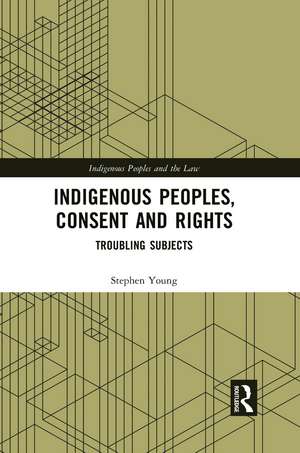Indigenous Peoples, Consent and Rights: Troubling Subjects: Indigenous Peoples and the Law
Autor Stephen Youngen Limba Engleză Paperback – 30 iun 2021
The basic notion of FPIC is that states should seek Indigenous peoples’ consent before taking actions that will have an impact on them, their territories or their livelihoods. FPIC is an important development for Indigenous peoples, their advocates and supporters because one might assume that, where states recognize it, Indigenous peoples will have the ability to control how non-Indigenous laws and actions will affect them. But who exactly are the Indigenous peoples that are the subjects of this discourse? This book argues that the subject status of Indigenous peoples emerged out of international law in the late 1970s and early 1980s. Then, through a series of case studies, it considers how self-identifying Indigenous peoples, scholars, UN institutions and non-government organizations (NGOs) dispersed that subject-status and associated rights discourse through international and national legal contexts. It shows that those who claim international human rights as Indigenous peoples performatively become identifiable subjects of international law – but further demonstrates that this does not, however, provide them with control over, or emancipation from, a state-based legal system. Maintaining that the discourse on Indigenous peoples and international law itself needs to be theoretically and critically re-appraised, this book problematises the subject-status of those who claim Indigenous peoples’ rights and the role of scholars, institutions, NGOs and others in producing that subject-status. Squarely addressing the limitations of international human rights law, it nevertheless goes on to provide a conceptual framework for rethinking the promise and power of Indigenous peoples’ rights.
Original and sophisticated, the book will appeal to scholars, activists and lawyers involved with indigenous rights, as well as those with more general interests in the operation of international law.
| Toate formatele și edițiile | Preț | Express |
|---|---|---|
| Paperback (1) | 387.38 lei 43-57 zile | |
| Taylor & Francis – 30 iun 2021 | 387.38 lei 43-57 zile | |
| Hardback (1) | 764.20 lei 43-57 zile | |
| Taylor & Francis – 21 noi 2019 | 764.20 lei 43-57 zile |
Din seria Indigenous Peoples and the Law
- 9%
 Preț: 935.66 lei
Preț: 935.66 lei -
 Preț: 281.27 lei
Preț: 281.27 lei -
 Preț: 483.49 lei
Preț: 483.49 lei - 12%
 Preț: 313.40 lei
Preț: 313.40 lei -
 Preț: 436.14 lei
Preț: 436.14 lei -
 Preț: 415.67 lei
Preț: 415.67 lei -
 Preț: 330.48 lei
Preț: 330.48 lei -
 Preț: 389.38 lei
Preț: 389.38 lei -
 Preț: 387.38 lei
Preț: 387.38 lei - 17%
 Preț: 256.58 lei
Preț: 256.58 lei - 19%
 Preț: 269.76 lei
Preț: 269.76 lei -
 Preț: 356.44 lei
Preț: 356.44 lei -
 Preț: 356.82 lei
Preț: 356.82 lei - 18%
 Preț: 1007.12 lei
Preț: 1007.12 lei - 18%
 Preț: 1004.06 lei
Preț: 1004.06 lei - 18%
 Preț: 1122.92 lei
Preț: 1122.92 lei -
 Preț: 389.07 lei
Preț: 389.07 lei - 21%
 Preț: 258.59 lei
Preț: 258.59 lei - 18%
 Preț: 949.28 lei
Preț: 949.28 lei
Preț: 387.38 lei
Nou
Puncte Express: 581
Preț estimativ în valută:
74.13€ • 77.59$ • 61.70£
74.13€ • 77.59$ • 61.70£
Carte tipărită la comandă
Livrare economică 31 martie-14 aprilie
Preluare comenzi: 021 569.72.76
Specificații
ISBN-13: 9781032085159
ISBN-10: 1032085150
Pagini: 276
Dimensiuni: 156 x 234 x 15 mm
Greutate: 0.4 kg
Ediția:1
Editura: Taylor & Francis
Colecția Routledge
Seria Indigenous Peoples and the Law
Locul publicării:Oxford, United Kingdom
ISBN-10: 1032085150
Pagini: 276
Dimensiuni: 156 x 234 x 15 mm
Greutate: 0.4 kg
Ediția:1
Editura: Taylor & Francis
Colecția Routledge
Seria Indigenous Peoples and the Law
Locul publicării:Oxford, United Kingdom
Public țintă
Postgraduate and UndergraduateCuprins
Table of Contents
Introduction
1: Troubling Subjects
2: The Emergence and Naturalization of Indigenous Peoples in International Legal Discourse
3: Defining Performances, The Problems and Promise of FPIC
4: FPIC as National Legislation: The Philippines, the B’laan and the Tampakan Mine
5: FPIC as International Human Rights Law: Australia, the Wangan and Jagalingou and the Carmichael Mine
6: FPIC as Regional Human Rights Law: The Inter-American Court of Human Rights and Indigenous Peoples
7: The Legal Performativity of FPIC
8: Insurrectionary Ends?
Reference and Bibliography
Introduction
1: Troubling Subjects
2: The Emergence and Naturalization of Indigenous Peoples in International Legal Discourse
3: Defining Performances, The Problems and Promise of FPIC
4: FPIC as National Legislation: The Philippines, the B’laan and the Tampakan Mine
5: FPIC as International Human Rights Law: Australia, the Wangan and Jagalingou and the Carmichael Mine
6: FPIC as Regional Human Rights Law: The Inter-American Court of Human Rights and Indigenous Peoples
7: The Legal Performativity of FPIC
8: Insurrectionary Ends?
Reference and Bibliography
Notă biografică
Stephen Young works in the Faculty of Law at the University of Otago
Descriere
Analysing how Indigenous Peoples come to be identifiable as bearers of human rights, this book considers how individuals and communities claim the right of free, prior and informed consent (FPIC) as Indigenous peoples.
